Putin & "international cooperation" on COVID
The Russian president's views on the WHO, Big Pharma & the "global fight" against coronavirus
Part I of this series examined Vladimir Putin’s role in the development and deployment of Sputnik V. Part II explored Putin’s views on compulsory vaccination.
This article will outline Putin’s stance on “international cooperation” on COVID. We will discuss developments after February 24 in a separate article.
Putin & the World Health Organization
Dr. Tedros Adhanom Ghebreyesus, the Director-General of the World Health Organization, announced on March 11, 2020 that COVID-19 “could now be characterized as a pandemic.”
“WHO has been assessing this outbreak around the clock and we are deeply concerned both by the alarming levels of spread and severity, and by the alarming levels of inaction,” Ghebreyesus said.
Almost overnight, nations began to “flatten the curve” using guidelines, protocols, and recommendations issued by the World Health Organization.
Russia was no exception.
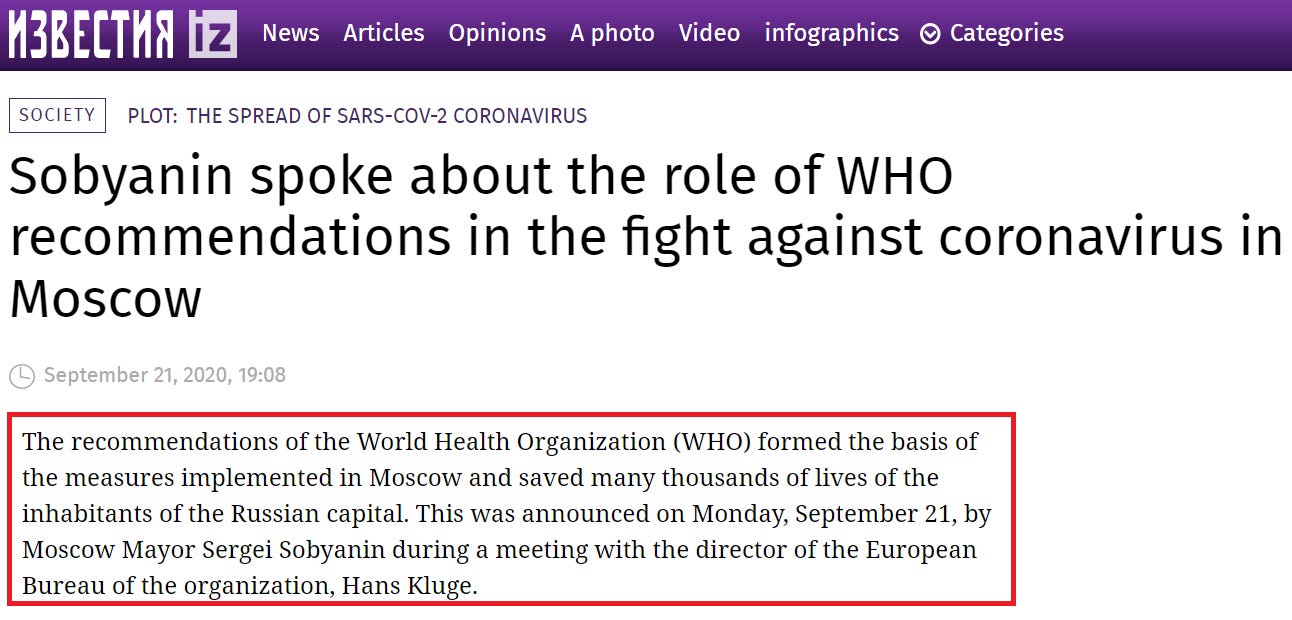
But what are Putin’s views on the WHO and its role in fighting COVID?
In a video address to the 75th session of the UN General Assembly on September 22, 2020, Putin underscored the central role of the World Health Organization in combating the pandemic:
Our country has been actively contributing to global and regional counter-COVID-19 efforts, providing assistance to most affected states both bilaterally and within multilateral formats.
In doing so, we first of all take into account the central coordinating role of the World Health Organization, which is part of the UN system. We believe it essential to qualitatively strengthen the WHO capability. This work has already begun, and Russia is genuinely motivated to engage in it.
Russia’s president stressed the UN and G20 states needed “fundamentally new horizons and scope of development” to address the socioeconomic impact of the health crisis:
Experts are yet to fully assess the scale of the social and economic shock caused by the pandemic and all its long-term consequences. However, it is already evident that it will take a really, really long time to restore the global economy. Furthermore, even the proven anti-crisis measures will not always work. We will need new innovative solutions.
He further urged for greater international cooperation to provide vaccines to the global population:
All capacities of the global pharmaceutical industry need to be employed so as to provide a free access to vaccination for the population of all states in the foreseeable future. […]
I would like to reiterate that we are completely open to partner relations and willing to cooperate. In this context, we are proposing to hold an online high-level conference shortly for countries interested in cooperation in the development of anti-coronavirus vaccines.
Putin also called attention to “digital technologies” employed to “quickly reorganize education, trade and services, as well as set up distant learning and online courses for people of different ages” during the pandemic.
On October 11, 2021, Putin issued a statement praising the first international exercises of mobile rapid response teams for epidemiological emergencies, hosted in Kazan by Russia’s Federal Service for Supervision of Consumer Rights Protection (Rospotrebnadzor) and the WHO.
“In recent years, we have clearly seen how relevant and in demand it is to ensure the maximum readiness of the sanitary and epidemic services to counter the threat of dangerous infectious diseases,” the message said.
Speaking at a G20 summit at the end of October, Putin once again called for greater cooperation in vaccine development, and said it would be “unacceptable” to “infringe” on the WHO’s global health “prerogatives”:
According to experts, the coronavirus will pose a danger for a long time to come—I think that WHO representatives will say more about this—and given the fact that this virus continues to mutate, we should develop mechanisms for a systematic, rapid update of vaccines. […]
Large-scale tasks in the fight against coronavirus require improving the quality and accessibility of medical care in all countries and, accordingly, building up international cooperation in the field of healthcare.
Given the current situation, the role of the World Health Organization is becoming increasingly important, and its activities, of course, deserve all-round support. Steps that would infringe on the prerogatives of the WHO, working under the auspices of the UN, are unacceptable. In this sense, I fully agree with the President of France, Mr. Macron.
Two weeks later, Putin appealed to the WHO to speed up the recognition of new COVID vaccines and drugs.
“With our common assistance, the World Health Organization could be even more actively engaged in mass immunization of the population,” Putin said on November 12, 2021:
It is vital not to weaken efforts to combat the pandemic, to do everything necessary to strengthen the healthcare systems of our countries, improve their resource and technological support. And the solution of these large-scale tasks, of course, would be facilitated by a qualitative increase in international cooperation in the medical and pharmaceutical fields.
Mutual recognition of vaccine certificates would allow countries to “fully resume global business, tourism and other activities,” he added.
He reiterated his position a week later.
“The role of the World Health Organization (WHO) is growing. It deserves all support, it could be even more active in conducting mass immunization, in particular, speeding up the prequalification procedures for new vaccines and drugs, that is, assessing their quality, safety and effectiveness,” the Russian president said on November 18, 2021.
Obtaining WHO certification for Sputnik V continued to be a top priority for the Russian leader.
“The most important task here is the vaccination of the population. We need to get the appropriate certificate from the World Health Organization as soon as possible so that our Sputnik V vaccine can be more widely distributed in the world,” he said on December 5, 2021.
Putin & Big Pharma
How does Putin feel about the vaccine collaboration between Russia and Big Pharma?
“Our foreign colleagues, thank God, have also turned to us and are ready to cooperate…Here, the Anglo-Swedish company AstraZeneca is ready to work with us, and are signing the corresponding agreement now,” Putin said on December 17, 2020.
Russia’s president was referring to a cooperation agreement between the Gamaleya Center, Russian pharma firm R-Pharm, the Russian Direct Investment Fund (RDIF), and AstraZeneca, to test the possibility of combining Sputnik V with the Anglo-Swedish shot.
Kirill Dmitriev, the CEO of RDIF, detailed the genesis of the partnership during an interview with CNN on December 17, 2020.
“Our scientists believe that if you use two different mechanisms, your efficacy will be higher. We reached out to AstraZeneca, explained our approach and they suggested that we do joint clinical trials. We believe that all of the vaccines now are very promising, they are promising to have great results and the combination with AstraZeneca, we believe may show greater efficacy as well,” Dmitriev told the American news network, adding: “I think it's very important to partner. We are proud to have partnership with AstraZeneca. We are open for partnership with others.”
Dmitriev’s excellent command of English is easy to explain: the World Economic Forum Young Global Leader (Class of 2009) received a scholarship from the Soros Foundation to study at Stanford University. After graduation, he moved on to Harvard Business School. Dmitriev then worked for Goldman Sachs and McKinsey & Company before taking the reins at RDIF in 2011.

Obviously we cannot hold Putin responsible for Dmitriev’s utterances. So what did Putin say about this new joint venture?
During a videoconference marking the partnership’s formation, Putin applauded Russia’s teamwork with AstraZeneca as a model to emulate:
I am absolutely convinced that such a spirit of partnership today can serve as a good, convincing example of combining scientific forces, technologies, investments for a common goal—to protect the life, health and safety of millions of people on the planet as a whole.
My colleagues and I at the G20, the summit of the leaders of the world's twenty leading economies, talked a lot about this. And I want to emphasize that practically all the speakers agreed that we need to join forces to fight the coronavirus.
This is actually in our final document. In this sense, today you are doing exactly what the G20 recommended, and what the United Nations has repeatedly addressed to specialists from all over the world—to join forces. It is important to use all the possibilities of international cooperation in order to bring as close as possible the moment when the dangerous infection will finally be defeated.
Addressing AstraZeneca’s CEO, he added: “I want to wish you success not only in the Russian market, but also in global markets, and express the hope that the new year will be favorable for your company and for solving the problems that we are now talking about.”
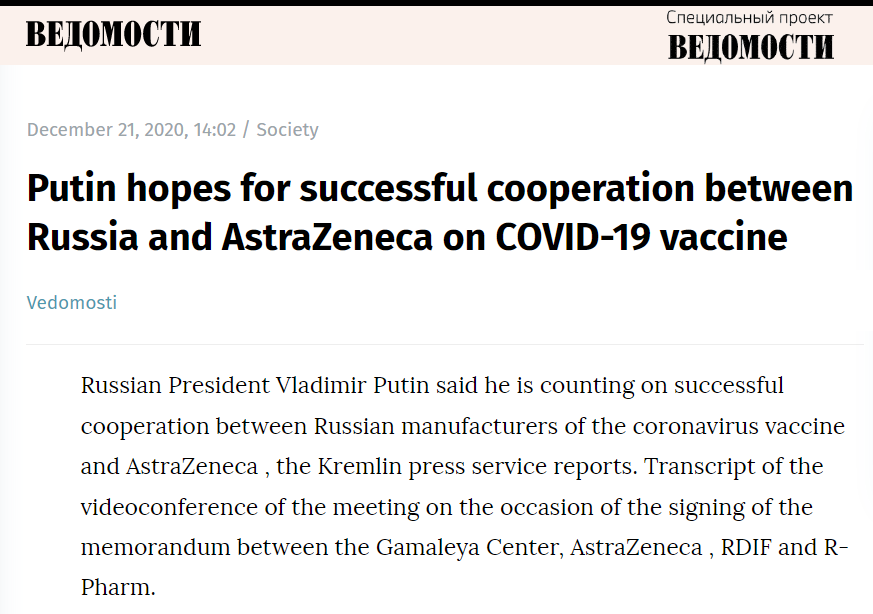
Even as reports of vaccine-related injuries continued to pile up, Putin didn’t shy away from his country’s collaboration with AstraZeneca.
“In some European countries, vaccinations have been stopped, because there are deaths. We, thank God, do not have a single case of severe side effects, ”Putin said on March 4, 2021:
We are not gloating in any way. On the contrary, we wish them success. Pfizer is a global company with a wonderful scientific base, they will surely respond, they will improve the parameters of their drug. We work together with AstraZeneca, you must have heard it.
Putin & “international cooperation”
Speaking at the Davos Agenda 2021 online forum on January 27, Russia’s president called on the World Economic Forum to assist in international efforts to increase access to vaccines:
We need to coordinate the efforts of the entire world, as the UN Secretary-General suggests and as we urged recently at the G20 summit. It is essential to join and coordinate the efforts of the world in countering the spread of the virus and making the much needed vaccines more accessible. We need to help the countries that need support, including the African nations. I am referring to expanding the scale of testing and vaccinations.
We see that mass vaccination is accessible today, primarily to people in the developed countries. Meanwhile, millions of people in the world are deprived even of the hope for this protection. In practice, such inequality could create a common threat because this is well known and has been said many times that it will drag out the epidemic and uncontrolled hotbeds will continue. The epidemic has no borders.
According to Putin, central banks needed to take a lead role in developing a “sustainable” solution to the economic aftermath of the pandemic:
[We must] ensure that this [economic] recovery is sustainable in the long run, relies on a high-quality structure and helps overcome the burden of social imbalances. Clearly, with the above restrictions and macroeconomic policy in mind, economic growth will largely rely on fiscal incentives with state budgets and central banks playing the key role.

In a meeting with Russia’s Security Council on November 19, 2021, Putin restated the necessity of working with the world community to end the pandemic.
“The work, especially today, to combat the pandemic requires the combined efforts of the international community, we have talked about this many times with you,” he said.
Putin returned to this topic at the start of December.
“We consistently hold the idea that it is possible to effectively counter numerous challenges and threats only through the joint efforts of the entire international community. We are constantly reminded of this by the situation related to the coronavirus pandemic. The insidious infection is far from being defeated,” he stressed.
RIA Novosti reported on December 1:
The President is convinced that without joining the efforts of all states, without establishing mutually beneficial equal cooperation, it will not be possible to solve global problems.
“There will be no success in fighting climate change, or in countering terrorism and crime, or in ensuring sustainable development,” he said.
Part IV will explore who (or what) is directing Russia’s COVID “response”
If you support international cooperation with Edward Slavsquat, subscribe!

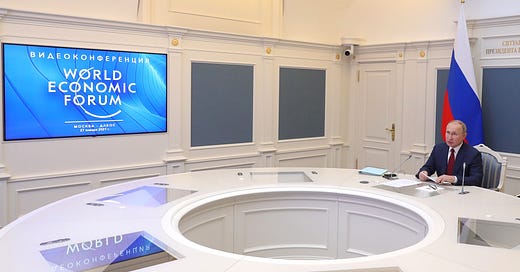



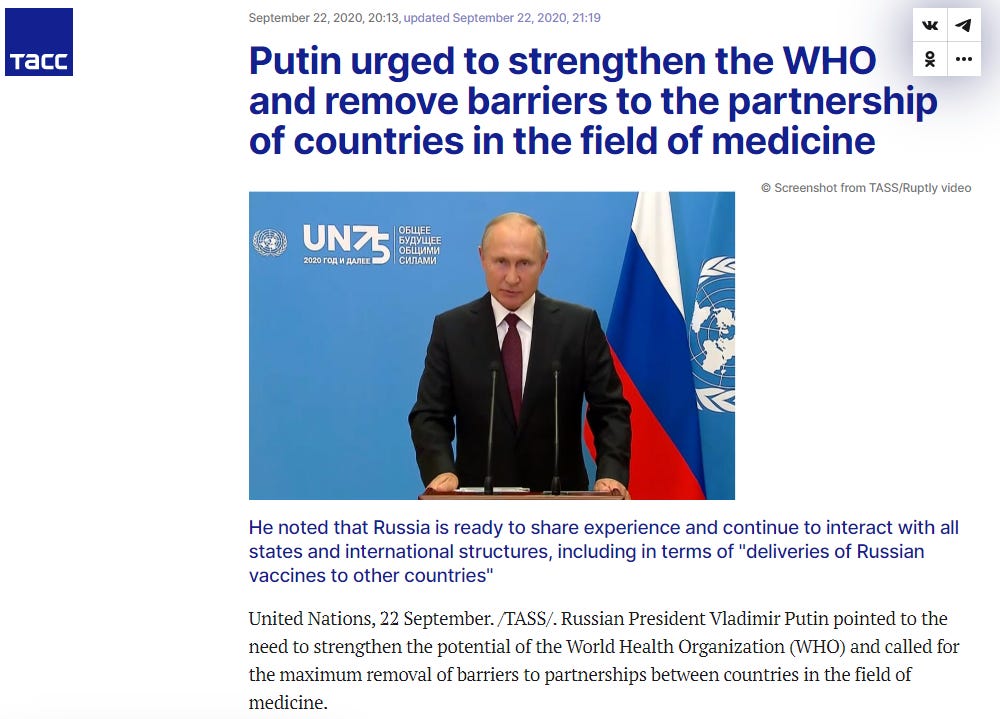
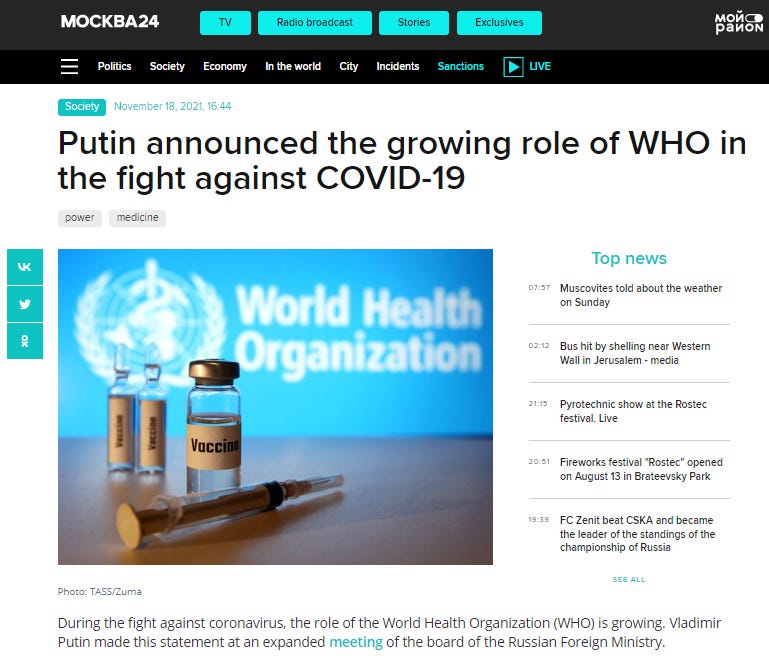
But multipolar totalitarian system is better than a unipolar one, the brainwashed will say...
Yeah, this 5d chess really gives me comfort that Putin etc are on our side in secret, while they push the same fucking nonsense that the west pushes. Hahaha
The Covid scam was necessary to implement digital surveillance.
Regarding injections, what is the difference between Putin and a Western leader (and i'm not talking about Botox injections)?
Putin leads the policy that Obama prepared in 2010 with the Senate Healthcare bill HR 3200
https://en.wikisource.org/wiki/H.R._3200/Division_C/Title_V/Subtitle_C#Sec._2521.
Look at section 2521, concerning "``(ii) a class II device that is implantable, life-supporting, or life-sustaining."